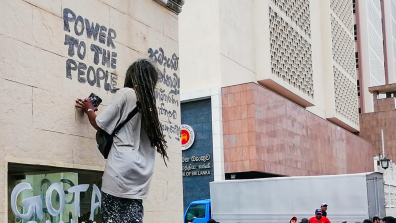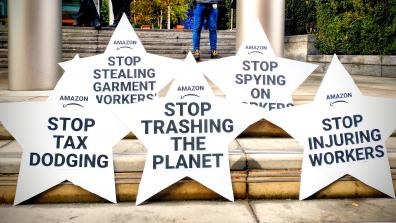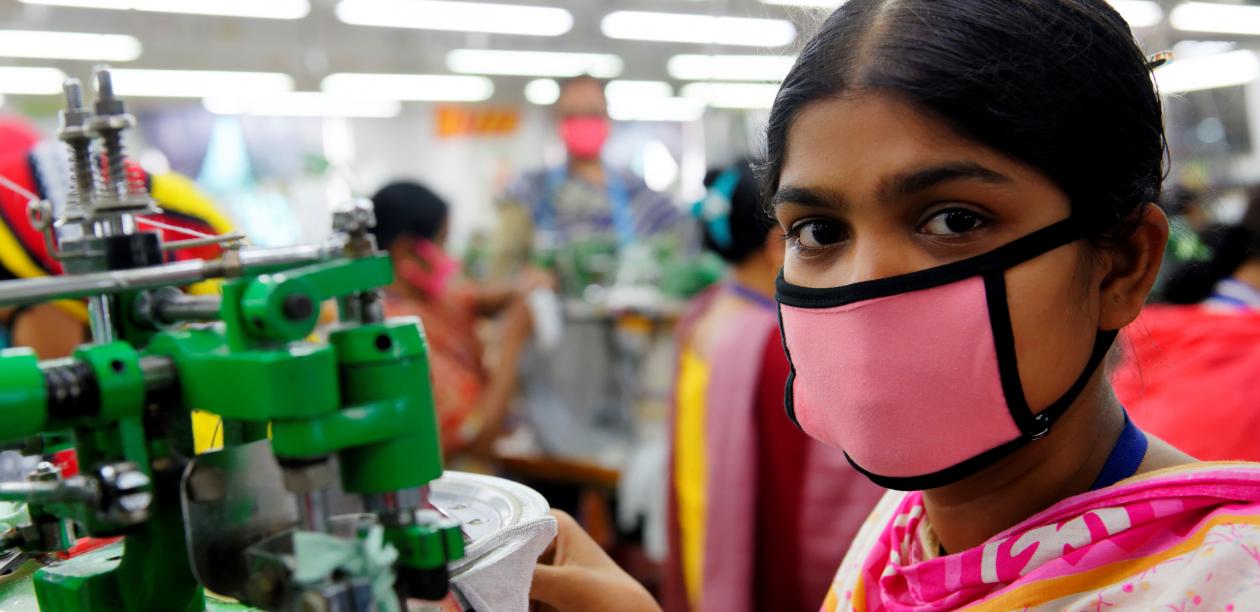Apple's iPhone X: rotten to the core
Today marks the 10 year anniversary of the Apple iPhone, and 10 years of grisly labour abuses of the millions of workers who have made Apple the richest company in the world, now worth a staggering $868 billion. While Apple marks the anniversary with the launch of the iPhone X, people all over the world are taking part in a Global Day of Action against Apple, to call for an end to entrenched worker exploitation in their factories.
War on Want's partner, Hong-Kong based Students and Scholars against Corporate Misbehaviour (SACOM), have revealed the outcome of extensive investigations at Apple’s manufacturing factories in China and made the explosive revelation that not only confirms Apple’s notorious labour abuses in factories, but exposes the coercion of thousands of young people to fill the labour shortage to ensure the phones are made on time. The students making Apple’s iPhones have reported having their secondary and tertiary vocational certificates being held for a ransom until they complete the grueling ‘internship’ working for three months straight without even a day off, on the production line.
These quasi-employment arrangements of millions of student interns - who occupy an ambiguous space between being a student and a worker - allow corporations like Apple to secure a steady supply of cheap labor through coordinated support of provincial governments that prioritize corporate investments over education, integrity and student welfare. These students often studying for vocations that are entirely unrelated, are required to work 3 months on the production line, and required to do the same work as other employees but either as unpaid or underpaid workers.
Although Apple, and its primary manufacturer, Foxconn have denied the use of student labour, SACOM has discovered thousands of students aged from 16 – 18 years old, working in at least three different factories in China to produce Apple’s iPhone’s. They report working from 8am – 8pm every day of the week for three months without even one day off.
One 18 year old student, who was studying accounting said, “We were forced to come. If we refused, our status would be demoted to that of “self-funded students” which would have effectively meant discontinuing the study. A 16 year old fashion design student said that she would be denied her graduation certificate if she didn’t work at least 12 hours a day, 7 days a week in the factory. “Yes, I do study electronics, but what can I learn from merely inserting screws all day for three months?” one intern said.
iPhone’s are Apple’s main profit driver, accounting for half of Apple’s extraordinary revenue. Apple’s shareprice has hit a record high, and the company is now sitting on a cash-pile of $268.9 billion that is being held in offshore tax havens, allowing Apple to not only rob workers of fair wages, but also the public purse in countries around the world by dodging taxes. In 2014, with cash-holdings of $155 billion, the ITUC reported that 50% of this would allow the company to increase the annual wages of the 2.3 million workers in their supply chain by $34,000 each for a year.
War on Want’s Thulsi Narayanasamy said, “Apple is rotten to the core. The extent of their labour abuses of factory workers are scandalous. Apple’s ubiquitous logo represents the entrenched labour exploitation of millions of workers who have been left impoverished by a company worth billions that can’t even pay workers enough to live on. If Apple is a story of success, we need to recognize that success relies on the wholesale, normalised misery of millions of people”.
The suicides of at least 18 workers producing for Apple in Foxconn’s factories a few years ago were the tip of the iceberg. That their response to this was suicide nets – last used on slave ships – rather than an overhaul of working conditions is indicative of how disposable workers are. The planned obsolescence of iPhones, seeing consumers needing to purchase new phones after just a few years of use mirrors the disposability of the lives of people. As Apple embraces the quest for endless profits and shareholder value, they depend on systematically denying the fundamental rights of people, knowing that they won’t be held to account for these labour abuses. Because there is no law in existence that can do that. The law protects profits, not people.
The basic wage for factory workers in China hasn’t increased for five years since 2012, while the levels of inflation have meant that rent and food prices have nearly doubled. Workers have no choice but to work excessive hours just to make ends meet, entrenching the poverty of workers to an unprecedented level in China.
Jack Linchan Qiu, at SACOM, author of the book, Goodbye iSlave: A Manifesto for Digital Abolition said: “SACOM calculate that the living wage for an iPhone worker in Shenzhen, China, should be about $650 per month. But to earn this amount today, an average worker would need to pull off 80-90 hours of overtime every month – that’s more than double the legal cap of 36 hours. In other words, to make a living, workers have no choice but to break Chinese law”.
The problem is systemic: our global capitalist economic system is designed to do only one thing – create endless profits. This is done at the expense of every other human, environmental and moral consideration, as each of these considerations would impact on profit margins. Until we can recognize that no amount of tinkering around the edges of this beast will alter the material reality of labour exploitation being built into the system and entrenching and increasing the working poor the inevitable outcome of this, we cannot truly say that we are taking labour rights or indeed poverty eradication seriously.



